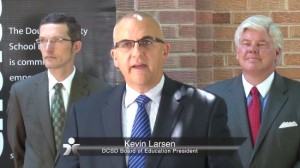
A Colorado school district is trying to take the legal fight for its voucher program to the U.S. Supreme Court, in a case that could have implications for school choice programs all over the country.
Last week, the Douglas County school district formally appealed a ruling against its school voucher program. Officials hope the federal court will hear their case, and think a win could spare similar programs around the country from future challenges under so-called Blaine Amendments that ban state aid to religious institutions.
In their petition to the court, filed last Wednesday, lawyers for the school district ask:
“Can Colorado’s Blaine Amendment, which the unrebutted record plainly demonstrates was born of religious bigotry, be used to force state and local governments to discriminate against religious institutions without violating the Religion Clauses of the First Amendment and the Equal Protection Clause of the Fourteenth Amendment?”
Earlier this summer, a plurality of Colorado’s Supreme Court ruled the voucher program aided religious schools, in violation of the state’s constitution.
The school district argues the court’s decision is discriminatory because it “employs a provision enacted in 1876 for the express purpose of discriminating against Catholics to compel a school district in 2015 to discriminate against religious schools and against parents who want to use a neutral scholarship to attend those schools.”
Lawyers for the Douglas County school district contend the state court’s decision — and by extension, the constitutional ban on aid to religious institutions — violates the First- and Fourteenth-Amendment rights of parents and students.
They also seek clarification on Locke v. Davey., in which the U.S. Supreme Court upheld a prohibition on scholarships for college students seeking theology degrees to become ministers. The district’s lawyers argue Colorado’s Supreme Court, along with other courts, have broadened Locke’s narrow focus to deny scholarships to students seeking educations at religiously affiliated schools.
The odds are usually stacked against the high court hearing a case, and this one is no exception. School choice advocates hope inconsistencies in the Colorado Supreme Court’s decision, and lingering questions about legal precedents, will be enough to pique justices’ interest.


